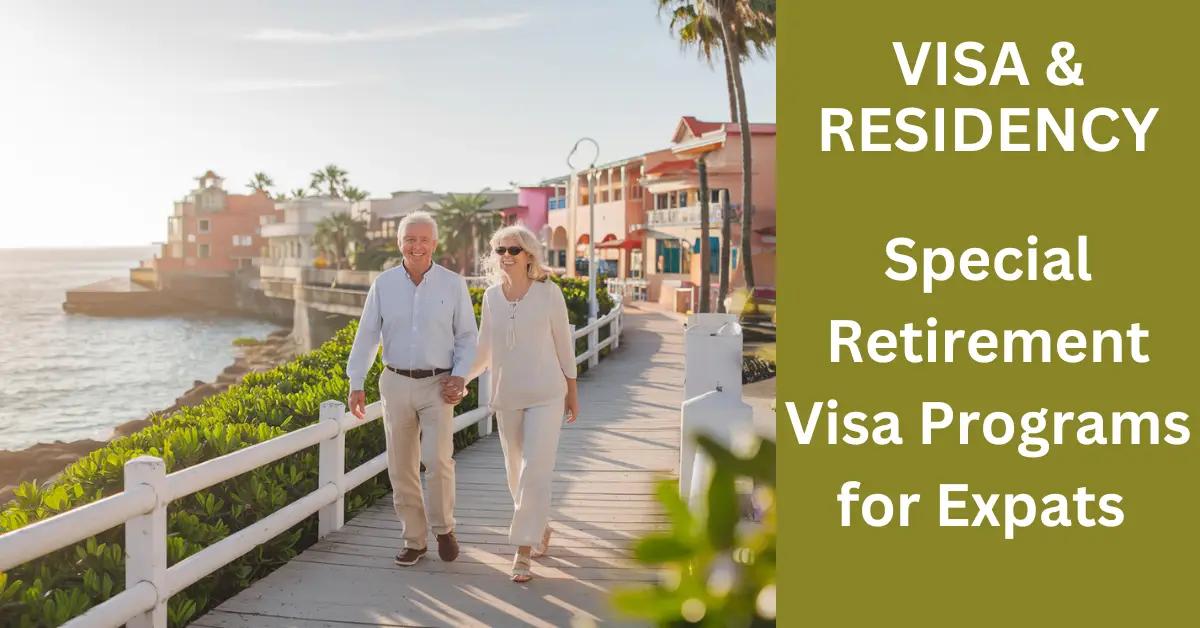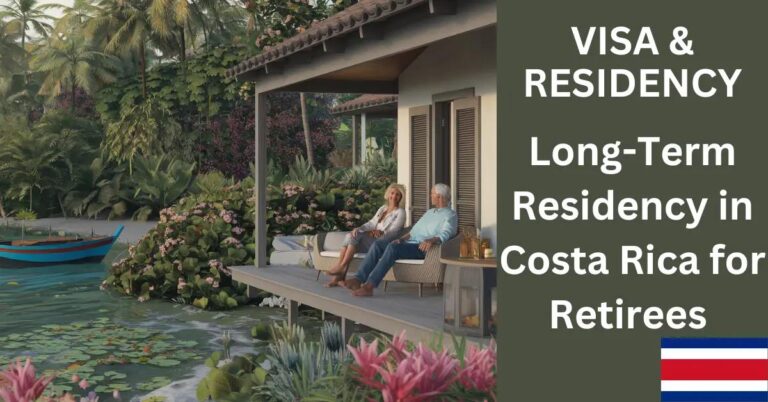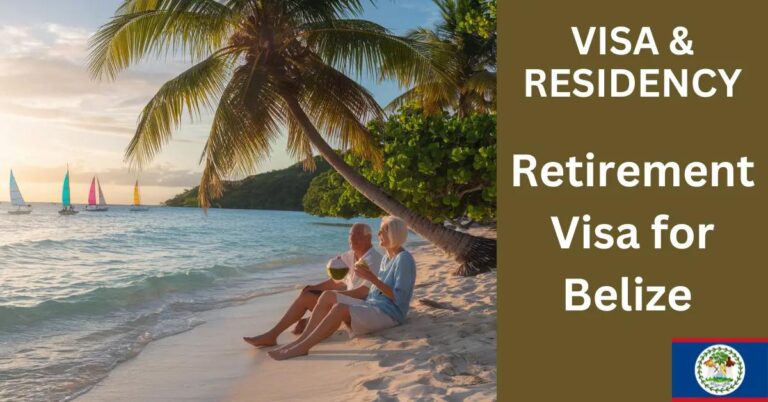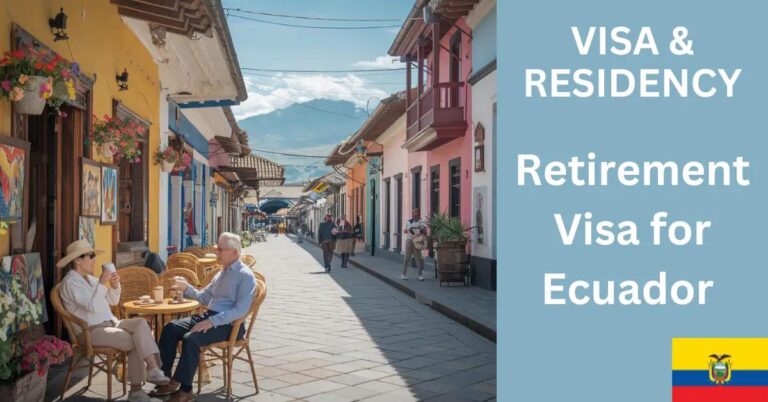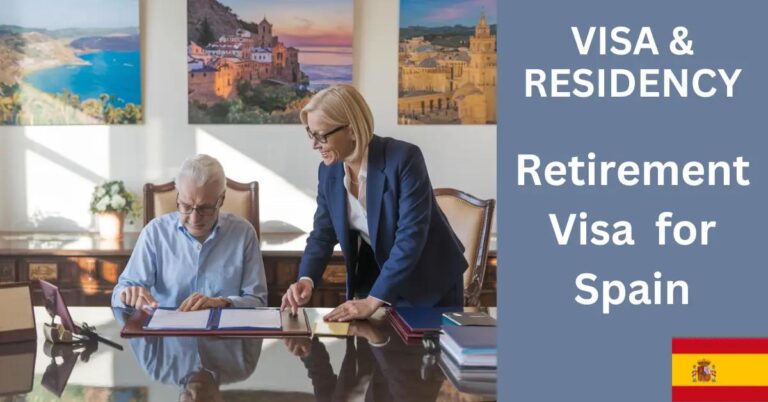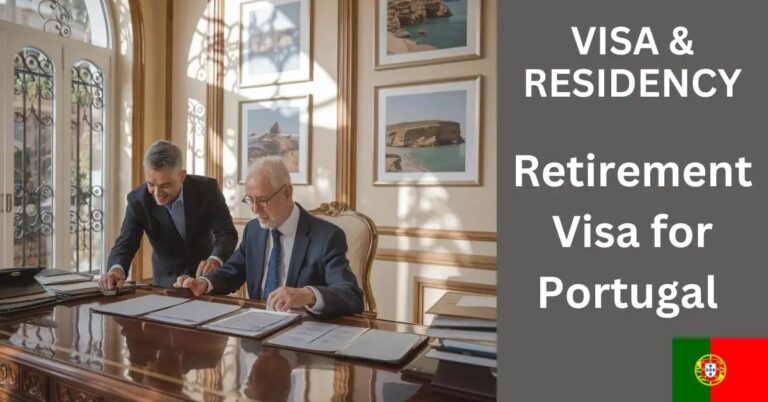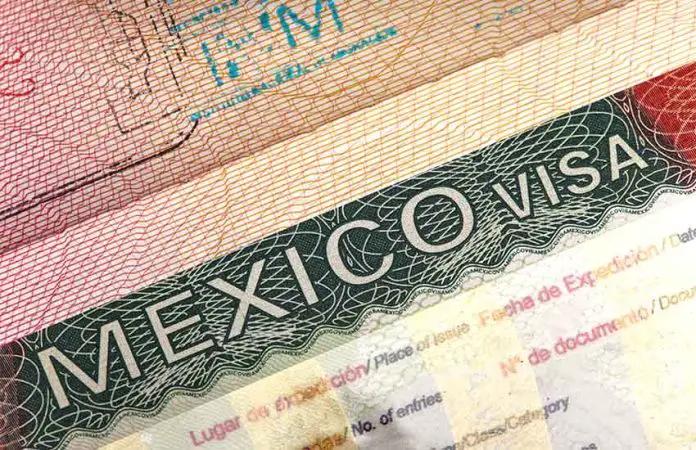TL;DR:
- Retirement visas simplify financial and lifestyle benefits; choose countries like Portugal or Spain for tax breaks and easy residency.
- Application steps: research visa requirements, gather documents, complete forms, submit applications, and attend interviews.
- Portugal, Mexico, and Thailand are affordable for retirees; Portugal's Golden Visa is popular for its lenient financial requirements.
- Healthcare varies by country; private insurance may be necessary for comprehensive coverage.
- Consider places like Portugal, Thailand, and Costa Rica for diverse lifestyles; financial, cultural, and visa factors are key.
- Be aware of tax obligations and potential double taxation; consult experts for retirement tax optimization.
- Visa renewal depends on the country; Portugal and Ecuador offer straightforward processes.
- Adapt culturally by joining local communities, learning the language, and embracing new customs.
Retiring abroad sounds exciting, but is it right for you? As someone who's navigated these waters, I know that special retirement visa programs can promise a new chapter full of adventure. They're tailored to make your golden years stress-free and culturally rich. But, are these programs the key to your perfect expat life, or a bureaucratic maze? Let’s dive into the benefits, hurdles, and hidden gems of these retirement visas.
Why Consider Special Retirement Visa Programs?
Retirement visas for expats come with many benefits, making them an attractive option. They often offer simplified processes and perks that enhance both financial and lifestyle aspects. One major benefit of a retirement visa is the financial simplicity it can provide. Many countries offer tax breaks and favorable exchange rates for retirees. This might stretch your savings further, allowing you to live more comfortably.
The lifestyle advantages are also significant. You can choose a country with a climate and culture that suits your retirement dreams. Imagine living near a sunny beach or in a vibrant city with rich history. These visas sometimes provide benefits like local discounts, access to healthcare, and even the chance to work part-time. This can enhance your quality of life and let you immerse yourself in a new culture.
Now, you might wonder which country has the easiest retirement visa. One popular choice is Portugal due to its Golden Visa program. This program offers residency with reasonable investment requirements. It's relatively straightforward and grants visa-free travel across Europe. An alternative for European retirement, with easy terms, is Spain. The Spanish non-lucrative visa is accessible if you have a stable income.
Choosing the right retirement visa program involves careful thought. You should consider the cost of living, healthcare access, and residency rules. Make sure to explore local culture and languages, too. Some retirees may prefer quiet places with nature, while others might seek bustling urban life.
Lastly, think about long-term goals and family visits. Proximity to loved ones can play a key role in your decision. Retirement visas can make relocating simpler and more beneficial financially and culturally. The right program can transform your retirement life into a fulfilling adventure.
How Do You Apply for a Retirement Visa?
Where can US citizens get a retirement visa? Retirees often head to Portugal, Mexico, or the Philippines.
So, let's talk about the application process. Begin by choosing your dream destination. Each country has unique visa rules and paperwork. Visit the official immigration website to get reliable information. For the Philippines, you can explore their official page here.
Next, gather your documents. Typically, you need a passport, proof of income, and a police report. You may also need medical records and health coverage evidence. Visit a notary to authenticate your papers if needed. It's wise to make copies of everything for your records.
The step-by-step guide is as follows:
- Research Requirements: Different nations have specific visa needs.
- Collect Documents: Ensure you have all necessary paperwork and backups.
- Complete Applications: Carefully fill out all application forms.
- Submit Application: Visit the embassy or use an online portal.
- Attend Interviews: Some countries have personal interviews.
To avoid common pitfalls, double-check all paperwork. Missing documents can delay the process. Also, keep track of any deadlines. Late submissions might result in rejection.
Some retirees forget about the language barrier. Use translation tools or hire help if needed. Miscommunication can lead to errors in your visa application.
Follow these steps, and you'll be closer to retiring in your dream location. The process seems complex, but breaking it down helps. Understand each step to ease your journey into your new home abroad.
What Are the Financial Requirements for Expat Visas?
Financial requirements differ from place to place, but certain rules are typical. Many countries need proof of regular income, like pensions or savings. For example, to retire in Thailand, you may need a monthly income of $2,000 or savings of $25,000.
Providing evidence usually means bank statements or official letters. Be ready to show this proof several times during your stay. Think of it as the way a country checks your financial ability to handle living costs.
Now, here's the big question: Which country is easy to get permanent residency for retirement? Portugal stands out. It offers the "D7" visa, which is quite lenient in its financial requirements. With enough income from stable sources, like real estate or investments, you might qualify.
To keep your finances in good shape, consider these cost-saving tips. Set a firm budget for your new journey. Also, always leave room for unexpected expenses. It's good to research local banking options, which might offer better deals on fees than your bank at home.
Currency exchange matters a lot, especially with ongoing income. Try to find favorable exchange rates to stretch your dollars. Opening a local bank account is useful, as it avoids high fees from foreign transactions. Use tools like XE or OANDA to monitor currency swings.
Budgeting is important, as moving money internationally often takes planning. You need to think about the impact of taxes on your overall finances too. Remember, keeping track of your spending can help you maintain your financial eligibility for visas.
For those seeking more information, check out Managing Finances Overseas. This guide helps with understanding the ins and outs of expat finances. It’s like having a map for your financial journey abroad.
Which Countries Offer the Most Affordable Destinations for Retirees?
Finding a new home for retirement can be exciting and challenging. One big question people have is: What country do most expats retire to? The answer, according to reports, is often Portugal because of its sunny climates and affordable living. Retirement in Portugal offers many perks, like friendly locals and a relaxed pace of life. Let's dive deeper into cost-effective global options.
Breakdown of Cost-Effective Countries for Retired Expats
Several countries offer affordability and appeal to retirees. Portugal offers a great balance between quality life and cost. Mexico, with its low living costs and rich culture, is another favorite. Thailand attracts many with its vibrant life and affordable healthcare. These countries stand out not just for their affordability but also for the quality of life they provide.
Comparison of Cost of Living in Popular Destinations
In these hot spots, retirees enjoy a good life without breaking the bank. A couple in Portugal may live comfortably on $2,500 per month. In Thailand, this could drop to $1,500. Mexico offers diverse settings with city or beachside living, often for under $2,000. Your lifestyle will shape your expenses, but these figures give a baseline.
Factors Influencing Cost-Effectiveness: Healthcare, Housing, Daily Expenses
Healthcare: Quality and cost of healthcare can vary. Thailand is known for affordable and top-notch medical care. In Mexico, many retirees opt for private insurance due to its cost. Portugal offers both public and private options, ensuring quality care.
Housing: Housing remains the biggest expense. In Mexico and Thailand, renting is affordable, with options under $800. Portugal offers both urban and rural rental spaces, with village homes being cheaper.
Daily Expenses: Everyday costs, like groceries and dining out, are less in these regions than in the US. For instance, local Thai food is often both delicious and cheap; the same applies to tapas in Portugal.
Learn more about the cost of living for expats in these destinations.
How to Navigate Healthcare and Insurance as an Expat Retiree?
Securing health insurance abroad is vital for expat retirees. Without it, unexpected costs can arise. Finding a plan that covers both local and international needs is crucial. It can save you money and provide peace of mind.
Navigating healthcare access for expats isn't easy. Every country offers different rules and services. Some countries have public healthcare, while others don't. In countries with public systems, you might not qualify for full access. Private insurance might be necessary for better access.
In the Philippines, expats often ask about special retirement visa programs. These programs make moving easier but don't cover all healthcare needs. You still must check for additional coverage options. Healthcare in the Philippines is affordable, but insurance enhances care quality.
Long-term medical care is vital, especially as we age. Plans might cover daily health needs but exclude special treatments. It's key to choose a policy that includes chronic illness care. Emergency services need special attention too. Some countries have high-quality emergency services, while others may not. Having a policy that covers air ambulance is a smart move.
Every expat retiree should research healthcare assets in their destination. You can use resources like Expat Focus to start. They offer valuable information about living overseas. Exploring the healthcare system before moving helps planning and avoids surprises.
Emergency services play a big role in healthcare plans. Rapid response is needed in emergencies. It's vital to understand how local services operate. Check if your insurance covers immediate care and hospital visits. Not having this can lead to high costs or delays in care.
By understanding health insurance needs and local systems, you can ensure a healthier, worry-free retirement abroad. Choose wisely, and stay informed to enjoy your expat life fully.
What Are the Best Countries for Expat Retirees?
When thinking of a retirement spot, the choices seem endless. But what makes a country stand out for retirees? Is it the ease of getting a visa, the culture, or the cost of living? Let's dive into some top options for expats looking to retire abroad.
Analyzing Top Countries for Diverse Lifestyles and Needs
Firstly, if you want a mix of old and new, consider Portugal and Spain. For those asking, "What is the easiest retirement visa in Europe?" the answer is often Portugal. With a Golden Visa program, it's a top choice for many retirees. But the country offers more than just an easy visa path. The culture is rich, with warm communities and stunning scenery.
Considerations for Climate and Cultural Adaptation
Moving on to climate, Thailand provides warm weather all year round. It's a popular choice in Asia due to its friendly locals and vibrant lifestyle. Here, retirees enjoy a relaxed pace and low living costs. Embracing local customs and foods can enhance the experience. Climate can greatly affect your daily life, so choose wisely.
Popular Regions: Retiring in Asia, Europe, and Latin America
Latin America has many choices, with Costa Rica often at the top of the list. Known for its stable government and beautiful views, it draws expats from around the globe. Its special visa is designed for retirees who can show a modest income.
By contrast, those who favor European charm might find Italy or Greece appealing. Each offers a distinct blend of history, culture, and picturesque landscapes. Adapting to a new culture can seem daunting, but these countries welcome retirees seeking a fresh chapter.
Choosing the right place depends on your priorities. Ask yourself: What is most important for my lifestyle? Is it the visa process, the weather, or the community? Whatever your preference, these countries offer varied and enriching retirements for expats.
How Do Tax Implications Affect Retiring Abroad?
Retiring abroad has many tax implications. As an expat, understanding tax is key. When you retire in another country, you face international tax requirements. Each country has its own system. Some double-tax, meaning you pay taxes to two nations. This can affect your savings and income during retirement.
Do you still pay taxes from home? Yes, many home countries require taxes on worldwide income. For example, the United States taxes citizens no matter where they live. This means you may owe tax both locally and back home. Always check with the tax agencies in your country.
Dual citizenship impacts taxes, too. When you hold two passports, you may owe taxes to both countries. Some nations offer treaties to prevent this. These treaties help but can be complex. A treaty might let you pay only the higher tax rate rather than both. You must explore treaties between your home nation and your new retirement country.
What about Ireland's retirement visa? Ireland attracts expats for its beautiful landscapes and friendly people. But taxes there can be high. You'll need to prove sufficient income for the visa, which ties to your tax situation. A right approach is important.
Strategies for tax optimization when retiring abroad are crucial. Consider consulting tax experts familiar with international finance. They guide on minimizing tax obligations legally and reducing tax bills, helping your retirement funds go further. They might suggest allocating pensions and investments over time or using special tax-sheltering methods.
Expat tax obligations should not deter you from retiring overseas. Rather, prepare your finances and understand obligations about taxes. You deserve to enjoy retirement in your dream destination, free from unforeseen financial worries. Once well-informed, retirement in a new place can be both relaxing and financially savvy.
What Are the Visa Renewal and Long-term Residency Options?
Renewing a retirement visa can be simple or complex. Each country has its own rules. Regularly check with local immigration offices for updates. Consider countries like Mexico, Thailand, or Portugal for easier renewal processes. They often ask for proof of income and local residence.
Which country has the easiest retirement visa? Thailand is often highlighted for ease. Their "Retirement Visa" requires a modest bank deposit. It's helpful because it minimizes documentation and financial requirements. Ensure funds are available and meet age and health prerequisites.
Long-term residency might be the next step for retirees. To transition from a visa to permanent residency, you may need to live in a country for several years. In Portugal, spend five years under the "D7 Visa" before applying for residency. This can provide stability if you plan to settle long-term.
Countries like Ecuador provide residency options with minimal financial evidence. A monthly income requirement ensures retired stability. This income can be from pensions or investments.
Legal restrictions can impact long-term residency. Some countries have strict policies for foreign property ownership. For example, Thailand limits land ownership. Be aware of property laws and citizenship requirements. Laws can affect tax obligations and inheritance rules. Always consult a legal expert familiar with local regulations to safeguard your interests.
For many retirees, long-term visas present an opportunity to enjoy new cultures. Spain's "Non-Lucrative Visa" is a good option. It offers a pathway to permanent residency with proof of financial means. This visa supports retirees looking for cultural experience without work commitments.
Don't overlook essential paperwork. Missing deadlines or incorrect forms can delay or nullify approvals. Stay organized with a checklist for your specific country requirements. With informed decisions, retirement abroad can be a rewarding journey.
How Can Expatriates Adapt Culturally and Socially?
Moving to a new place can be both exciting and hard. To adapt culturally and socially, expats can build social support networks. Finding a community of fellow retirees or locals can make you feel at home faster. Joining expat communities for retirees or local clubs can help you meet new friends who understand your journey.
Community events are another great way to dive into a new culture. They offer a chance to learn about customs and traditions. I suggest attending these events, even if it feels a bit out of your comfort zone. It's a wonderful way to feel connected and learn firsthand.
Language can be the biggest hurdle. One way to tackle this is through language immersion. Joining local classes or using language apps can build your confidence. Speaking even a little of the local language shows respect and effort, which locals appreciate greatly.
Some people might ask, "What is the easiest European country for a US citizen to retire to?" Portugal is often mentioned because of its welcoming visa policies, reasonable costs, and vibrant expat communities. English is widely spoken there, which helps ease communication.
Overcoming cultural differences can take effort, but it's possible. Recognize that misunderstandings might happen; they are part of the learning process. Patience and humor go a long way in smoothing these bumps.
Living abroad isn't just about seeing new sights. It's about living as part of a community, understanding their ways, and respecting their views. Open your heart to the new experiences, and soon, you'll find your place in this new chapter of life. Adaptation takes time, but the rewards can be rich and fulfilling.
How to Plan and Prepare for Retirement Abroad?
Planning a retirement abroad is like preparing for a new life adventure. First, set clear retirement goals and timelines. Ask yourself: "What do I want in my retirement?" Knowing your desires helps shape the plan. Do you dream of relaxing by the sea or exploring new cities? Decide when you want this adventure to start and how long it might last.
Next, focus on financial and logistical preparation. Make a budget that covers your living costs and lifestyle. Research the cost of living in your chosen country. Look into healthcare expenses, ensuring you have enough for unexpected costs. Check out local housing markets for rental or purchasing options. Good planning helps avoid surprises.
Budgeting for retirement is crucial for your peace of mind. Calculate the savings needed to cover daily life and emergencies. Consider currency exchange rates and their effect on your funds. Keep some money in your home currency and some in your new country's currency. It helps manage financial changes better.
Wonder which countries offer special retirement visa programs for expats? Many countries make it easier for retirees by offering such visas. These programs often require proof of income or savings. Some countries also have age requirements. Research restrictions before you decide on a country. It's part of your planning blueprint.
Resources and tools make overseas retirement planning more effective. Websites and forums with expat communities provide inside tips and stories. Financial advisors can help tailor your budget to fit international living. Planning apps track expenses and offer currency converters. These tools make planning abroad easier and less stressful.
For special retirement visa programs in the USA, keep up with changes in visa rules. The US doesn't have a one-size-fits-all retirement visa. Many retirees use regular tourist visas or apply for permanent residency through other means. Understanding your options ensures you comply with legal requirements when moving abroad.
Conclusion
Navigating retirement abroad offers rich experiences and easy living with the right visa. We outlined retirement visa benefits, application steps, and affordable countries. Consider financial requirements and healthcare options for a smooth transition. Remember to research tax and legal details to optimize your move. Building community and cultural adaptation are the keys to thriving in a new land. Choose a country matching your lifestyle and needs. With the right planning, your adventure awaits with open doors and countless opportunities.

